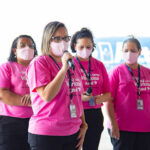No Name-Calling Week is observed during the third week of January to educate students, teachers, and the public on the harms of name-calling. This year, it takes place from January 20 to 24. People have been called unpleasant names for their weight, height, intelligence, sexual orientation, and others things they have little or no control over. While some consider name-calling harmless fun, victims of such names generally feel insecure, ashamed, and bullied, to extents that cause them to lose their self-esteem, feel unwanted in their immediate environments, and suffer emotional distress. Name-calling inflicts psychological injuries on victims and forces some of them into seclusion or to consider suicide.
History of No Name-Calling Week
The first observation of No Name-Calling Week was in 2004. It is a week created by K-12 teachers and students and sponsored by the Gay, Lesbian, and Straight Education Network (G.L.S.E.N.). Its focus is to end name-calling and other forms of bullying in school, by educating people about the harmful and long-term effects of bullying. The creation of the week was inspired by the story in a 2001 novel entitled “The Misfits,” written by James Howe. The book tells the story of four young adults who, at school, were mocked about their height, weight, what they said, and how they looked, respectively. With the intent to change their bullies’ perspectives, they contested for the school’s student council, and while they lost, they succeeded in convincing their principal to have a No Name-Calling Day to stop mockery.
Although name-calling is sometimes regarded as fun by name-callers, victims of the ill act feel hurt, especially if they are being called hurtful names for things they can’t change about themselves. Several movies have depicted the ill-effects name-calling could have on victims. When Bianca, the lead character in the 2015 film “The Duff,” found out that her classmates named her DUFF (Designated Ugly Fat Friend,) she felt very down. Subjected to sexual orientation mockery, Conor, the rugby genius of “Handsome Devil,” a 2016 movie, hid from the public and almost lost a well-deserved Rugby game victory to his bully.
The habit of name-calling has become so prevalent in American schools that, at one time, a survey revealed that around 75% of elementary school students admitted to having been called names in school, while about 65% of middle and high school students confessed that name-calling was a serious issue in their schools.
No Name-Calling Week timeline
According to the Merriam-Webster dictionary, the word ‘name-calling’ is first used.
James Howe publishes the first book in his “The Misfits” series.
G.L.S.E.N. organizes the first No Name-Calling Week in schools around the U.S.
“The Duff” and “A Girl Like Her” are released.
The movie featuring Conor as a mocked gay rugby school player is released.
No Name-Calling Week FAQs
Does name-calling also happen among adults?
Of course, it does. Bullying has no gender or age discrimination. However, unlike how it affects children and young adults, name-calling has a lesser effect on adults, as most laugh about it rather than get angered about it or even feel hurt.
How do you react to name-calling?
You can confront the name-caller and ask them to stop, or you’d report them to the appropriate authority. If you cannot do that, then the best way is to be confident about and reassure yourself that whatever you’re being called has no bearing on what great things you are meant for.
How damaging is name-calling in a relationship?
It can be very harmful, toxic even. A partner calling the other names will make the victim feel horrible about it and start looking down on themselves. It can also make them lose their self-confidence when they start believing whatever is said about them.
How to Observe No Name-Calling Week
Join your school's anti-bullying program
Schools around the U.S. organize programs during the week to inform students about name-calling. Participate in one or all the programs.
Make a signpost
Make a signpost that tells readers of the dangers of name-calling and why it is important to stop it. See how it contributes to the day.
Stop name-calling
They say change starts with you. What better way is there to celebrate this week than to resolve within yourself to stop calling others demeaning names? Let the change begin with you this week.
5 Facts About School Bullying You Should Know
Most common form
Verbal harassment, which includes name-calling, mockery, and insults, is the most common form of bullying.
Rampant in the U.S.
One-fifth of students in their teens have been bullied.
Leads to truancy
Over 150,000 teen students have skipped school because of bullying.
Bullied students perform poorly
Bullying has a direct influence on test scores as most students who are bullied score lower marks in class than their peers who aren't bullied.
Influences other people's thoughts
Bullies are most likely to influence what other people think about those they bully.
Why No Name-Calling Week is Important
It reduces name-calling occurrences
With No Name-Calling Week, there is an increased awareness of how harmful name-calling can be, thereby mitigating its occurrence. It is a very important cause.
It gives hope to victims of bullying
The week's celebration reassures victims of name-calling and gives them hope to see the end of their painful ordeal. We all need hope.
It generally reduces bullying
Since name-calling is a form of bullying, programs organized during the weekly celebration are also directed at stopping other common types of bullying, thereby bringing a general decrement to them all. We love this!
No Name-Calling Week dates
| Year | Date | Day |
|---|---|---|
| 2022 | January 17 | Monday |
| 2023 | January 16 | Monday |
| 2024 | January 15 | Monday |
| 2025 | January 20 | Monday |
| 2026 | January 19 | Monday |
























